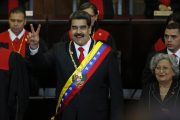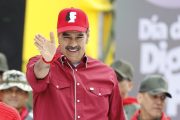
Ecuadorian President Rafael Correa (left) is perceived by many to be leading his country down the road of Venezuelan-style statism, socialism, and dictatorship — increasingly so in the past several weeks. In the most recent example, a May 7 constitutional referendum — despite opposition members and activists in the human rights community labeling the 10 proposed areas of reform a power grab on behalf of Correa’s government (including the proposal to give the President more of a say over judicial appointments) — the President’s “reforms” received widespread support from Ecuadorian voters. While casting his vote, President Correa dismissed the opposition’s concerns. “They’ve been saying it’s totalitarian… [a word] used for a state in which things are done by force. We’re doing this democratically,” he protested.
Correa declared victory after two separate polls indicated a large margin of votes in favor of the reforms. “Today, we made an important step toward peace, democracy and a new motherland,” he said after the first results came out. “The truth and the Ecuadorian people have been the winners in this.”
All 10 ballot measures earned an average of 62 percent affirmative votes in what has been seen as essentially a vote of confidence in the 48-year-old leader, who has governed since 2007.
Educated in economics at Harvard, Correa was first elected in 2006 and took office in January 2007. Previously Ecuador’s Minister of Finance under former President Luis Alfredo Palacio Gonzalez, Correa describes himself as a humanist, “Christian leftist,” and a proponent of 21st-century socialism.
A disciple of Venezuela’s socialist leader Hugo Chávez, Correa has attacked opposition journalists, harassed private companies, and weakened freedom; he will now have greater powers to regulate media content and punish reporters, judges, magistrates, and businessmen who disagree with his radical agenda. This represents a huge setback for those Ecuadorians struggling to preserve the basic civil liberties that Americans take for granted. Correa’s image as a strong leader concerned with poverty and injustice plays well in a country tired of years of economic and political turmoil, and, like Chávez, Correa has already won a string of national votes and consolidated his power with a new constitution, while rewriting rules for mining and oil companies to increase state income.
Analysts say that the overwhelming yes vote improves President Correa’s standing ahead of presidential elections in 2013, when he would run for a third time. Like Cain and Abel, Correa ironically faces opposition from his own elder brother Fabricio, a wealthy businessman embroiled in a corruption scandal who has called on voters to stop his brother’s “fascist” ambitions. “The president is convinced he is the salvation for the country and is taking steps to implement a totalitarian system,” Fabricio Correa told Reuters. “He always thought of himself as the messiah the country needed.”
Others have raised similar concerns. The organization Freedom House, alarmed by the passing of Correa’s 10 ballot measures, says that the referendum will give the Ecuadorian President undue influence over the country’s media, as well as its judiciary. The mandate will create a government commission that will monitor and regulate media content as well as prohibit media enterprises from investing in other sectors. The regulatory body, which in practice will be controlled by the government, will oversee television, radio, and print content. The purview of this body — the overly vague categories of violence, sex, and discrimination — would give it the power to administer sanctions against violators. Although the referendum passed on all issues, the proposal regarding a media regulatory commission won by the narrowest margin, a sign that Ecuadorians recognize the potential threat of government interference.
“Correa’s continuous demonization of independent media and the use of criminal defamation suits to silence journalists are having a chilling effect on the press in Ecuador,” said Viviana Giacaman, Freedom House’s senior program manager for Latin America, adding, “Attention and action from the international community is urgent in order to safeguard the freedom and human rights of the Ecuadorian people.”
In one example of the defamation suits referred to by Glacaman, President Correa filed a criminal suit three months ago for $80 million in damages against the newspaper El Universo; as a result, columnist Emilio Palacio and the organization’s executives face up to three years in prison for printing a “slanderous” article. The complaint was prompted by a February 6 editorial by Palacio describing the September 2010 police rebellion in which he referred to Correa as “the dictator.” In an interview, Correa called the column irresponsible and insisted that the paper’s directors be held responsible for publishing the piece. “Freedom House calls upon the Ecuadorian government to adhere to its obligation to respect international standards of freedom of expression,” declared Giacaman.
Meanwhile, the London-based International Institute for Strategic Studies (IISS) published a new report this month that accuses President Correa of soliciting financial assistance from FARC, the well-known Colombian narco-terrorist outfit, during his 2006 presidential run. According to the IISS study, FARC gave $100,000 to a Correa supporter, and there is compelling evidence that this money was then deposited into Correa’s campaign account. The report says that FARC — a Marxist-Leninist outfit with ties to Hugo Chávez, Moscow, and Iran, among others — has long been in cahoots with the Ecuadorian government, and that Ecuador is in fact quickly becoming a narco-democracy. Gustavo Larrea, who has held positions as Interior and Security Minister under Correa, had direct links to FARC, along with José Ignacio Chauvín, briefly his deputy in the Interior Ministry, and Maria Augusta Calle, a television journalist and currently a legislator for Correa’s Alianza PAIS political movement. All deny supporting the guerrillas.
Furthermore, under Correa, diplomatic relations between the United States and Ecuador have been severely compromised. The Obama administration initially pursued a friendly rapprochement with the socialist regime (in the same manner in which relations with Venezuela were pursued). In April, Correa expelled U.S. Ambassador Heather Hodges after learning from secret diplomatic cables released by WikiLeaks that she had criticized Correa’s tyrannical ways, as well as the country’s widespread corruption and ties with FARC and other narco-terrorist groups.
Most alarming, however, about the latest developments in Ecuador is that these tyrannical reforms came about through democratic means, giving credence to the warnings of the Founding Fathers on the dangers of a democracy. When a government is not a republic (based on rule by law, such as our Constitution) but rather a democracy (based on simple majority-rule) — it lacks a foundational sense of inalienable rights and freedoms, and allows liberty to be done away with at the whim of the “tyranny of the majority,” as evident in the Ecuadorian people essentially voting away their freedoms upon being lured by the seductiveness of Correa’s message of socialist reforms, social justice, and democracy.
Thanks to democracy, it appears as if yet another South American nation has fallen into the clutches of a budding communist tyranny.




